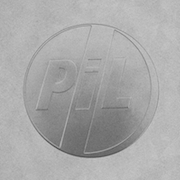To watch him return to the fray in the wake of 2012’s This Is PiL album – the first in 20 years under the Public Image Ltd banner – was to witness the real John Lydon. Or, at least, if not the real John Lydon then certainly where his musical heart really lay. Gone was the hunched and gurning caricature of Johnny Rotten, a hideous amalgam of Richard III and Albert Steptoe, and in his place was someone who was taking himself as seriously as a performer and artist as the music that he was making.
Make no mistake: Never Mind The Bollocks… remains one of the most incredible rock & roll albums ever committed to vinyl for posterity, a huge slab of rhythmic sound that’s every bit as furious now as when it was released under a whirlwind of outright hostility and moral outrage, but watching the Sex Pistols’ third comeback in 2008, it was difficult to shake the feeling that Lydon was playing a part and giving the gallery what it thought it wanted.
The re-release of Metal Box 37 years after its first appearance is to be re-acquainted with an album that seemingly has no precedent. Here augmented by three additional CDs of b-sides, Peel Sessions, alternate mixes and a live recording from Manchester’s Russell Club, the original album still sounds like nothing else from the time, as if a line is drawn on the sand and the full potential of what punk had to offer is finally realized. Indeed, Metal Box is still so far ahead of the curve that if it was getting its inaugural release now and it’d still be daring other bands to catch up.
Allegedly made up on the spot, opener ‘Albatross’’ power to shock and compel in equal measure remains firmly in place. Jah Wobble’s bass, a low and rumbling vibration that drives the track urgently forward, is as much a weapon as it is a rhythmic tool. Rock solid, its forward propulsion is mercilessly relentless as to become totally hypnotic as it locks in with the steady drums. Keith Levene’s inventive and percussive guitar leaves behind the blues that made up so much of post-50s rock music to take his instrument into uncharted waters. His stabs and breaks are like shards of splintering glass that slice and serrate while opening a whole new world of possibilities.
And Lydon? Unencumbered by traditional song structures, his haunting and spectral wail takes centre stage in the huge spaces of sound that are left by his cohorts. Here, he shakes off the history of his previous band while making barbed attacks on its professional and personal mismanagement. Even after all this time, his voice is unnerving and utterly unique experience.
Mortality and suffering looms large on Metal Box. The death of Lydon’s mother from cancer is tackled on ‘Swan Lake’ (aka ‘Death Disco’), his wail a testament to grief and bereavement as Wobble locks into another murderous groove while Levene cops moves from Tchaikovsky to create a moment of twisted beauty. Elsewhere, abduction and rape form the basis of ‘Poptones’ and the relationship between Wobble’s swooping bass-line and Levene’s circular and perverted arpeggios paint an unsettling backdrop on which Lydon recounts the grim tale.
Metal Box’s status as a demarcation line between what went on before it and what was to come is well justified. That it still sounds so bold, so daring and so creative after all this time is a testament to the vision of its principle players. But it also harks back to a time when risks could and would be taken and propelled to a wider audience. The band’s gatecrashing of Top Of The Pops on primetime TV with ‘Death Disco’ – then creating one of those magical “did you see” moments – is unimaginable now. Even so, the sounds and ideas contained within its grooves are as inspirational now as they were then. Indeed, there’s envy to be reserved for those who are yet to hear this remarkable record for the first time.
And speaking of the grooves, it’s worth noting the re-mastering on this extended edition. The album was originally released as three 12 inch singles in order to produce not just a greater clarity in sound and dynamic range, but for those monstrous bass moves to truly leap out of the speakers. Here they do so again and the effect is stunning. The remaining discs offer insight into the creative process and will be of interest to anyone who’s been seduced by the album’s dark charms but it all comes back to the original album. It hasn’t dated in the slightest and in spite of the intervening decades still points the way forward. If you know and love Metal Box then you’ll know what to expect, only more so. If you’re still to be acquainted with it then you’re urged to rectify that situation with all haste.


